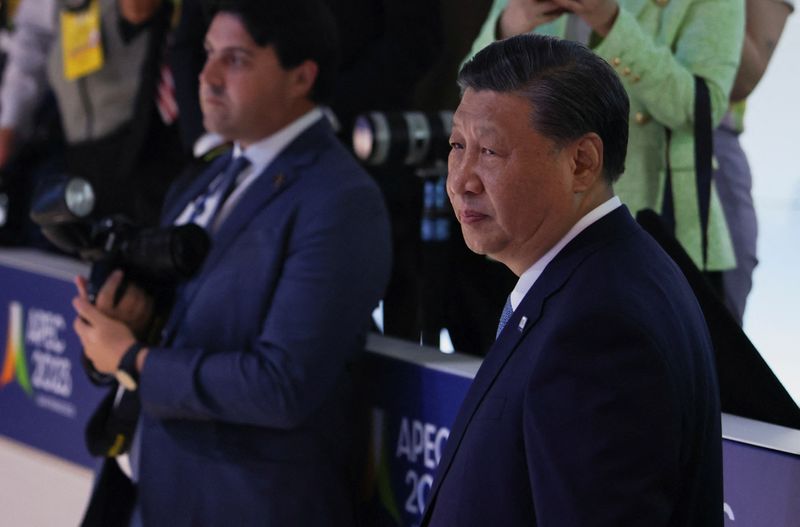China’s Xi visits Vietnam after Biden, seeks to boost ties
2023.12.11 20:24

© Reuters. China’s President Xi Jinping attends the Leaders Retreat at the Asia-Pacific Economic Cooperation (APEC) Summit in San Francisco, California, U.S. November 17, 2023. REUTERS/Carlos Barria/File Photo
HANOI (Reuters) – China’s President Xi Jinping starts a two-day visit to Vietnam on Tuesday, three months after U.S. President Joe Biden travelled to Hanoi as the two great powers vie for influence in the Southeast Asian nation.
The trip, Xi’s first in six years, has been months in planning and was even briefly considered to take place days before Biden’s visit, according to officials.
It is aimed at boosting relations between the two Communist-ruled countries which have very close economic ties but are at odds over boundaries in the South China Sea and have a millennia-long history of frequent conflict.
The visit has been delayed also because of prolonged discussions over how to phrase the countries’ enhanced bilateral relations, which Beijing wants to be framed as “common destiny,” a reference that Hanoi has resisted but is expected to have eventually accepted, according to officials and diplomats.
Beyond the symbolism of elevating ties to a notch that Beijing may see as being above the U.S.-Vietnam relationship, the upgraded status comes with the signature of “dozens of cooperation documents,” according to China’s ambassador to Vietnam Xiong Bo, as reported by Vietnamese state newspaper Tuoi Tre before the visit.
Among the expected deals are Chinese investments to upgrade rail links between the two neighbours, which would include grants, although the volume of aid is not clear and neither is the amount and terms of possible loans.
Both countries have expressed interest in boosting transport connections. Vietnam is willing to export more to China, especially farm products, and Beijing wants to integrate northern Vietnam further into its southern supply chain networks.
Many Chinese companies have moved part of their operations to Vietnam at a faster pace this year than before the pandemic to be closer to Western clients in Vietnam, lower risks from U.S.-China trade tensions and reduce exposure to China’s weakened economy.
Strengthened rail connections would facilitate import of components from China for assembling in Vietnam, effectively expanding China’s new silk road, which Beijing calls the Belt and Road Initiative (BRI).
China has also pushed to include Vietnam in its Digital Silk Road, which may entail investments for new undersea optical fibre cables, the 5G network and other telecoms infrastructure.
The only project so far that has received BRI loans in Vietnam is the Hanoi metro, although Vietnam prefers not to openly label it as a BRI project, in a sign of how sensitive it is to show too close ties with Beijing.
Easier trade and stronger cooperation in several sectors including renewable energy, rare earths and tourism are also among the possible agreements.








